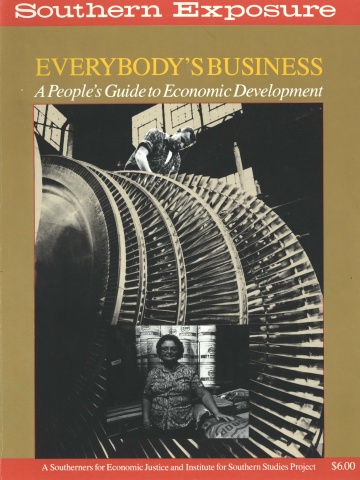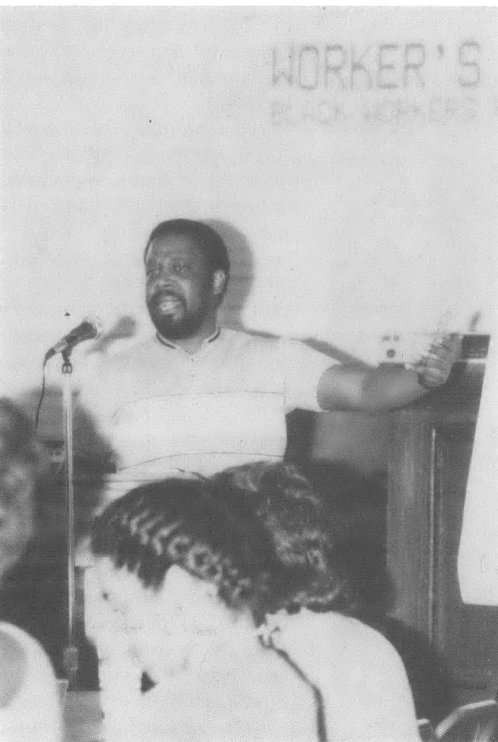
This article originally appeared in Southern Exposure Vol. 14 No. 5/6, "Everybody's Business." Find more from that issue here.
Worker-owned businesses or cooperatives reach only a tiny fraction of the population. For most people, economic development means increasing their control and benefits in a workplace where they have no equity interest, no rights as owners. Expanding and defending their rights as workers is the day-to-day struggle that dominates their perspective on "economic planning," "economic democracy," or "strategies for development."
In the Black-Belt South, historical conditions pose special problems for this struggle. Defined by its roots in a plantation-based political economy, the Black Belt still comprises the U.S. region with the heaviest concentration of black and poor people. Generally, blacks make up 30 to 70 percent of the population in these counties. Centuries of racism, anti-labor propaganda, and violent opposition to workplace organization have left workers in the Black Belt among the nation's most racially polarized, least educated about worker rights, and most fearful of collective action.
Black communities in this region have developed their own strategies for economic success. Far more often than efforts led by progressive whites, these strategies draw on a mixture of political activism and electoral politics, church-based education and service programs, leadership development and constituency building, and the creation of alternative, community-controlled institutions. Examples of groups currently involved in such work range widely from the Alabama-based Federation of Southern Cooperatives and MACE in Mississippi, to the Institute for Community Education and Training in South Carolina and the Gulf Coast Tenants Leadership Project headquartered in New Orleans.
As much as any group in the South, the eastern North Carolina-based Black Workers for Justice has successfully combined these approaches to focus directly on the condition of black wage earners. The group doesn't seek publicity for itself and receives little money from foundations or church agencies. Instead, it relies heavily on a core of dedicated activists and a leadership committee drawn from members in several counties from Raleigh eastward.
Black Workers for Justice (BWFJ) began in 1981, composed of three Rocky Mount workers fired from KMart for protesting the company's discriminatory labor policies, other KMart workers, and their supporters. In many ways the campaign to reinstate the fired workers became a paradigm for future BWFJ organizing. Community support led to a boycott of KMart in 1982, and although the workers were never rehired, the company replaced the local store manager who had been a target of the protest.
Since then, BWFJ has organized committees in more than a dozen work sites and played a key role in many labor and community struggles. In a revealing 1983 report, it describes its program as "building a framework of black worker contacts and committees in several counties, tied to industries and workplaces; using leaflets and conducting activities to draw out the key issues in those workplaces to make them popular issues in the entire county."
In addition to "building collective consciousness and solid organizations" at work sites, the program emphasizes "the building of county-wide support structures, so black workers can mobilize the support of their churches, county and civic groups and small businesses around their struggles on the job and in the community."
In one example of linking workplace and community issues, BWFJ helped block a 1984 request by General Bearing Company for a county-approved, tax-exempt industrial bond to finance a plant expansion in Wilson. Genbearco asked officials to waive the requirement that facilities using the bonds pay employees above-average wages for the area. As community pressure mounted, the company withdrew its request for the bond and eventually gave workers at its existing plant a substantial wage increase.
In the past three years, BWFJ has expanded its base inside Genbearco, published a shop-floor newspaper, successfully defended fired workers, taken an active role in the statewide campaign for a "Right-to-Know" law, and forced the replacement of the plant manager and personnel officer.
In Whitakers, in nearby Nash County, BWFJ members and the Bloomer Hill Community Association stopped Consolidated Diesel from evicting black residents to make room for its new factory. The organization now has members in the plant as well as the community. Black workers have forced several production line changes, fought for increased benefits, and won compensation for injured and laid-off workers. With community members, they also successfully pushed for an indictment of a white farmer who ambushed and wounded his daughter's black boyfriend; no arrest had been made in the case, illustrating the double standard of the criminal justice system in the South.
In January 1986, BWFJ mobilized broad community support in Rocky Mount to force city officials to rescind their secret approval of a Klan march and demonstration on city property; the planned rally never happened. Later in the year, BWFJ's "women's commission" began developing a committee in one of the city's garment factories where a BWFJ member had been fired for leading a work slowdown.
And for the past two years, the organization has intensely worked on instituting an affirmative action policy at Allied Maintenance, a contractor with Wilson's largest employer, Firestone Tire and Rubber. The campaign has already resulted in several promotions of black workers and productive discussions with many white workers about the effects of racism on their treatment and the union's strength at Allied. In 1986, the majority-white union elected black workers as vice president, recording secretary, and chief shop steward.
Confronting racism, advocating affirmative action policies, and promoting a deeper understanding of the oppressive systems at work in the Black Belt are consistent themes in BWFJ's work. "Ever since slavery, the black working class has been used as a source of cheap labor for the development of Northern industries and cities, Southern plantations and farms, and certain areas in the South," says Saladin Muhammed, a key BWFJ member in Rocky Mount.
"In the last 20 years, many Northern industries have moved to the black belt South to use this cheap black labor force to make greater profits and be further protected by the racist political system which has denied black people real democratic rights and political power over their communities."
Because this historical pattern of exploitation cheapens the value and bargaining power of all labor in the U.S., "the struggle to end national oppression is in the best interest of all workers, black and white," Saladin concludes.
Developing working-class leaders who can refine this analysis in nondogmatic terms and understand its consequences for day-to-day organizing is central to how BWFJ operates. The emphasis is on the quality of leadership rather the quantity of members or projects. "We can't effectively build Black Workers for Justice by just pulling workers together to talk about the historical oppression of black people. Our starting point must be concrete issues and struggles growing out of the workplace, patiently developed and associated with other workplaces," says Saladin.
"Workers are angry," he adds, "but most of them haven't understood how big the problems really are, what real power they have, and who their allies and enemies are — that's where education and a working-class consciousness come in."
As a centerpiece in this strategy, BWFJ recently opened a new library and workers' community center in Rocky Mount. It also sponsors an ongoing series of training programs on topics ranging from the duties of union shop stewards to the historical role of black labor in the South. This series has involved dozens of area workers, and an annual Martin Luther King banquet has grown to more than 400 participants.
A bookstore run by BWFJ members in Raleigh (another center of the organization's activities) regularly features presentations on South Africa, Central America, and other topics related to Afro-American liberation and the labor movement. In rural Nash County, a five-month-long "Workers' School" — drawing students from around the region for one- or two-day sessions per month — focused on giving in-plant leaders skills in public speaking and organizing as well as political theory.
The organization's newspaper, Justice Speaks, makes clear the group's class analysis and international perspective, which puts black workers at the center of social struggle. But rather than being intellectual rhetoric, the emphasis on theory is balanced with a practical focus. The newspaper, for example, mixes stories about a variety of local organizing situations with two or three national and international articles so that workers in eastern North Carolina can see their problems and possibilities in a broader context.
Issues of Justice Speaks are frequently passed out or sold in front of workplaces involved in controversies covered by the paper. It thus becomes an organizing tool as well as a medium for educating and tying together a slowly growing readership.
Significantly, BWFJ members who distribute the paper at one plant generally work somewhere else. Retaliation by employers against outspoken workers — regardless of color — is still a way of life in the Black Belt and a major obstacle for BWFJ and union organizing. Once identified as "troublemakers," in-plant organizers are frequently removed.
To persevere in this atmosphere requires more than an intellectual agreement with theories about class conflict. BWFJ members are neither armchair radicals nor embittered working-class rebels. They are among the minority doing the solid, patient organizing and rank-and-file agitation for economic democracy that so many others say is needed but find too difficult, too risky, too exhausting to attempt.
Tags
Bob Hall
Bob Hall is the founding editor of Southern Exposure, a longtime editor of the magazine, and the former executive director of the Institute for Southern Studies.

